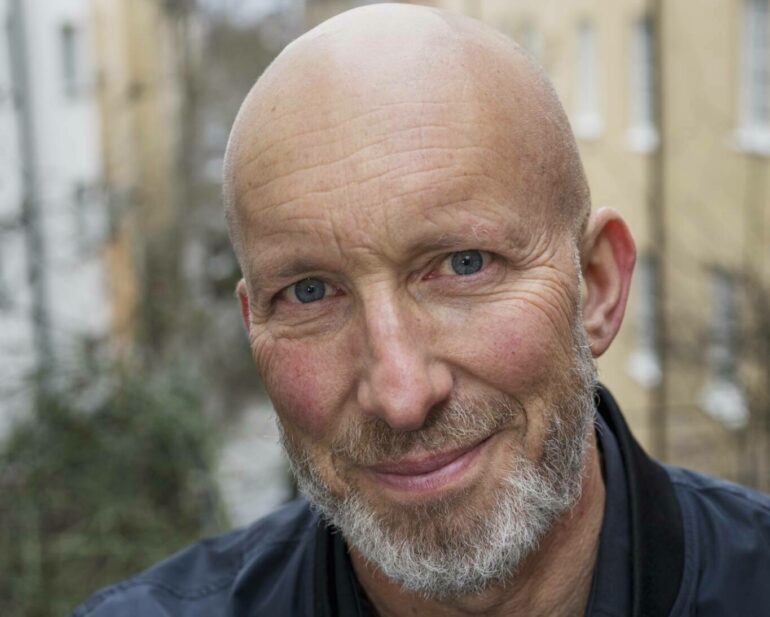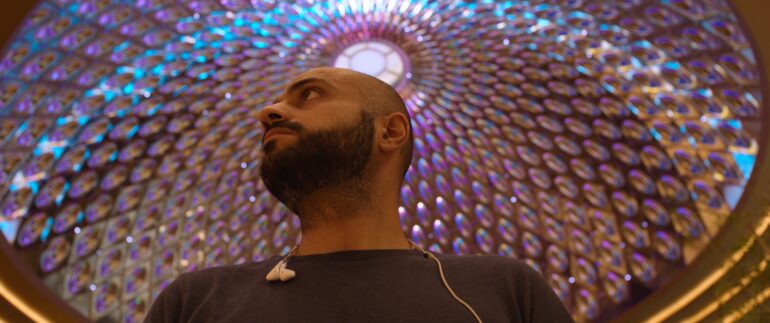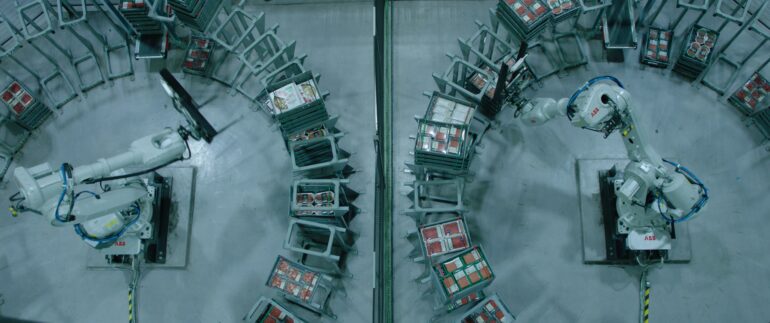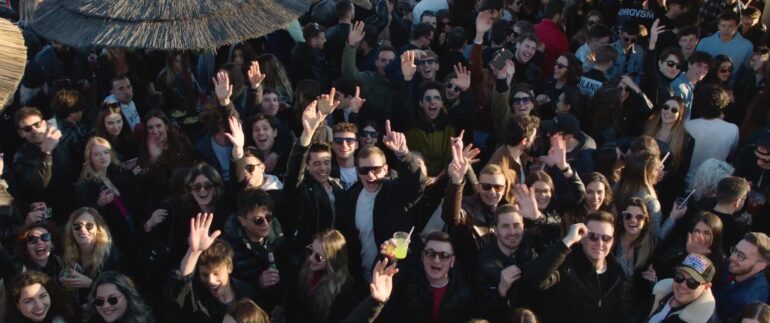WRITTEN BY: Annika Pham
The Swedish documentary produced by Fasad world premiered March 19 at CPH:DOX’s main Dox:Award programme. We spoke to the director.
Erik Gandini is both working as filmmaker/producer at Fasad and professor of documentary film at Stockholm University of the Arts.
After his multi-awarded films Videocracy, The Swedish Theory of Love, Surplus and Gitmo, he is turning to the nature of work in the 21st century in the wake of the rise of AI and automation.
Shot between the USA, Kuwait, South Korea and Italy, the film looks at how artificial intelligence and automation will force us to rethink our relationship to work and work ethics.
While the topic has often been dominated by technology experts and economists and described as a sci-fi dystopia, Gandini offers a different existential narrative. Through his “idea-driven film”, as he describes it, and with the backing of illustrious academics and commentators - including linguistic Noam Chomsky, philosopher Elisabeth Anderson, to author Maqss Al Kout-he explores what things could be like in the future in a work-free society.
The film was produced by Jesper Kurlandsky of Fasad, Sweden, in co-produced with Propaganda Italia, Indie Film, Norway, Rai Cinema, SVT, Film I, co-financing from VPRO and Geo Television Germany.
We spoke to Erik Gandini.
Your trademark is to use a sociological approach to your documentary works and here you look at the rise of AI and automation and its possible impact on the nature of work. What brought you to this study?
Erik Gandini: On a personal level, my father worked 64 years for a concrete company in Italy and was perfectly happy about it. I started to reflect on my own existence. Will I ever feel, that I have worked too much in my life?
Then this idea of reflecting on the future of work and what we will do when we do not have to work, came from an encounter I had with the work critique/sociologist Roland Paulsen. He discusses the notions of fear and values that make us work sometimes more than needed.
I decided to take as a starting point the subject of Artificial Intelligence and automation.
Usually these are discussed from a technological standpoint, but I was going to research it from an existential perspective. What if we do have 850 million people who will be out of work in the next decade due to automation? How would they feel? What would be their purpose in life? Somehow, there is a clash between the idea of work that had a meaning 350 years ago, and was born with the industrial revolution and this near future of technological unemployment. We must come up with new ideas to rethink our work - centred society and our relationship with work.
What made you focus on South Korea, Italy, the US and Kuwait?
EG: I have this love for documentary where you can go out with an open-ended question.
I took as case studies the US and South Korea as countries anchored in the present, that struggle with the lack of imagination of what could be life without work.
The US are a very wealthy nation, but people take only two week-vacations. I’ve always wondered…how come? Americans are in a way conditioned to feel guilty about not working, but they don’t really try to address this issue. South Korea in contrast does try to address this problem. In the film I interview the Minister of Labour who describes the government’s attempt to change the culture of working overtime. One example is of a man who overworks and neglects his family. There is a real clash of generations there, with fathers who simply miss out on sharing their family’s lives.
Then in the film, there is a turning point, with [linguistic] Noam Chomsky and Elon Musk who claim that soon there will be a new reality with AI. Indeed the past three months, there has been debates about Chat GPT [OpenAI’s chat box], it’s pro’s and con’s for human beings.
Through my filmic narrative, I then turn to the future and look at Kuwait, where the local population doesn’t need to work thanks to its rich oil-based economy and a huge foreign workforce, often working under slave conditions. The society there seems to run on a sort of Universal Basic Income (UBI), but they pay people to pretend to work. This example gives an idea how the ideology of work has reached an extreme, where people are being paid basically just to sit behind a desk, and work for the sake of working.
Then I focus on Italy, where I explore a different perspective of work, though the prism of rich people who choose to work, but don’t actually have to work. I also look at a rather unknown phenomenon, which is problematic for Italian authorities. It’s the category of youngsters between 20-34 who in the statistics are work-free or Not in Employment, Education or Training (NEET). That’s a real issue in Italy.
The film also looks at another aspect of work, which is people who are disconnected to what they’re doing. Your interviewee-Gallup managing partner Oa Sinyan who researches “The state of the global world force”, says for instance that only 15% of people are engaged with their work. This is quite a sad finding…
EG: Yes it’s almost scary. What a missed opportunity if you have 850 million employees in the world who go to work without drive or purpose. What a waste! But it’s a reality and that can’t be sustainable. I hope the film will inspire people to question what we do at our workplace.
You haven’t discussed this in your film, but do you feel the pandemic has transformed the ideology of work?
EG: Before Covid, when people talked about the social welfare concept of Universal Basic Income, it felt absurd. But after the pandemic, this concept was more acceptable and even the Pope spoke positively about subsidies for work. Some countries basically paid people for no real effort in return during Covid.
What is your own vision of the Universal Basic Income as a political tool to compensate from the eventual loss of jobs due to AI and automation, and after work solutions in general?
EG: Well UBI is a redistribution of wealth and for some capitalists like Elon Musk or Jeff Bezos, at a time of AI and automation, it would be a way to keep people happy and avoid social arrest. So it’s not only the political left that is in favour of this. Sometimes the left is even against it. For instance the Social Democrats in Sweden find it difficult to give trust to people.
This is where Chomsky is strong. He says that people are born creative, but creativity is being taken away from them and they accept to live as slave workers. The solution is to educate individuals, and help them rethink how to make the best use of their time.
My big take with this film is that art has a role to play and I hope that the film will intrigue, provoke, inspire people and create sparkle.
Could you discuss your visual style and collaboration with famed cinematographer Frederik Wenzel?
EG: First of all, I want to explain that the project actually started as a cross-disciplinary research project. I work in the academic environment, as professor of documentary film at Stockholm University of the Arts, and I can devote some of my time to artistic research. Here, I did an artistic research project with sociologist Roland Paulsen and Jyoti Mistry, film professor at Valand Academy in Göteborg.
I wanted to find an aesthetic where you could work with the chronological dimension of the near future in a genre-documentary - that doesn’t naturally allow futuristic exploration. My vision was to use the traditional doc storytelling tradition, interviewing people, certainly not relying on weird sound design.
After Work is what I would call an idea-driven film, not-character-driven. I was looking for a visual style that would combine a realistic technique and floating aesthetic. That was possible thanks to my collaboration with Fredrik Wenzel who used among other things steady cam shots. He also collaborates with focus puller Sofia Liander who makes sure the focus is always in place, and both are in total symbiosis. Both worked on Ruben Östlund’s Triangle of Sadness and The Square. For me, it’s been like working with a dream team.
Then of course I collaborated with my regular editor and composer Johan Söderberg [The Swedish Theory of Love, Videocracy]. The music was also arranged by Christoffer Berg [Border] who recorded the music at the Ennio Morricone Studio in Rome.
How special is CPH:DOX to you?
EG: I love it! It’s been for a long time my favourite festival. They have an open-mind regarding the art of documentary filmmaking and have expanded its scope, in terms of what it is and what it could be. I have produced Marcus Lindeen’s The Raft which won at DOX:Award 2018, so it’s a very special place to me.
TO SEE THE TRAILER CLICK HERE.



